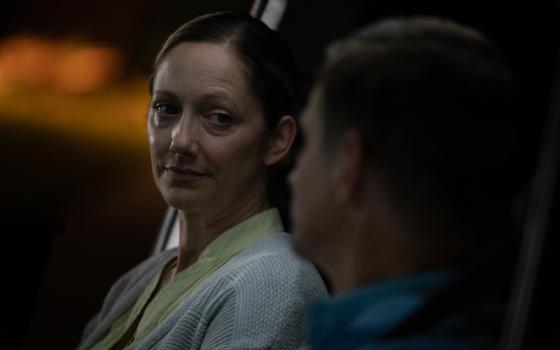The Holy Father's message marking the World Day of Prayer for the Care of Creation is not the kind of document you expect to be exciting. Popes issue messages to mark this celebration and that, and the texts usually sound like the bureaucratic creations they are, the desired effect of focusing attention on a particular issue is frustrated by the dull and lifeless prose. But, then, along comes Pope Francis, and expectations must be recalibrated.
After a tip of the biretta to our fellow Christian churches and some nice quotes from Laudato Si', the pope cuts right to the chase. "Global warming continues, due in part to human activity: 2015 was the warmest year on record, and 2016 will likely be warmer still," he states. "This is leading to ever more severe droughts, floods, fires and extreme weather events. Climate change is also contributing to the heart-rending refugee crisis. The world's poor, though the least responsible for climate change, are most vulnerable and already suffering its impact." I need hardly point out that such words would have gotten him booed off the stage at the Republican National Convention in Cleveland! To his credit, Francis does not argue with those who deny climate change. To borrow an image from former Congressman Barney Frank, it would be like arguing with your dining room table. The pope states the facts and lets the crazy deniers howl like wolves, in the distance.
The Holy Father embraces the environmental cause, not the other way round. He does not dabble in earth-worship or human-bashing. He keeps concern for the human person at the center of his focus and calls environmental degradation by its proper, Christian name: sin. "During this Jubilee Year, let us learn to implore God's mercy for those sins against creation that we have not hitherto acknowledged and confessed. Let us likewise commit ourselves to taking concrete steps towards ecological conversion, which requires a clear recognition of our responsibility to ourselves, our neighbors, creation and the Creator."
As with all Christian confrontations with sin, the pope commends us to start with an examination of conscience which, as he writes, "involves 'gratitude and gratuitousness, a recognition that the world is God's loving gift, and that we are called quietly to imitate his generosity in self-sacrifice and good works. ... It also entails a loving awareness that we are not disconnected from the rest of creatures, but joined in a splendid universal communion. As believers, we do not look at the world from without but from within, conscious of the bonds with which the Father has linked us to all beings.'" The quote is from Laudato Si', but here he is taking his prior work and inserting it into a meditation on the need for mercy. It is splendid to see the connections Francis makes between what strikes many of us as disparate concerns.
When he gets to the "firm purpose of amendment," he lists the small things that each of us can do to improve the planet's chances of surviving, from reducing our consumption of paper and plastics to turning off the lights. The funny thing is that since reading Laudato Si', I actually do find myself turning off the lights and thinking of the pope, being more conscious of the amount of energy I use. I have never been profligate, but I was never before very attentive. I do put more attention on recycling. It isn't hard, it just takes mindfulness, but in our fast-paced, internet-driven age, mindfulness takes time, focus and a willingness to box out distractions. There is so much to distract us. The pope wants us to focus on what matters, what really matters, and few things matter more than doing our part to save the planet and to save our souls. And to not grow discouraged: "We must not think these efforts are too small to improve our world," he writes.
Inserting care for creation into the works of mercy is a stroke of genius, in both directions. The insertion allows us to place concern for creation within a spiritual context that has long been part of our tradition, and doing so displays the cohesive wholeness of the tradition in a new light. The pope writes, "We usually think of the works of mercy individually and in relation to a specific initiative: hospitals for the sick, soup kitchens for the hungry, shelters for the homeless, schools for those to be educated, the confessional and spiritual direction for those needing counsel and forgiveness. ... But is we look at the works of mercy as a whole, we see that the object of mercy is human life itself and everything it embraces." Contra those who wish to isolate life issues from environmental issues or immigration issues (yes, I am talking to you Cardinal Burke!), the pope sees everything as interrelated.
This is our Catholic tradition alive. Tradition is not a Tridentine figurine to be put up on the mantle, dusted weekly, admired by the company, but of no real use. Tradition must be engaged and it must be made our own, by each succeeding generation, and that ownership requires that we pose our questions, not our grandparents' questions, to the tradition and seek our answers within. There are two extremes in the church. There are the frozen-in-time conservatives, for whom tradition is unchanging (and therefore dead) because it is kept as a museum piece, as if it were too fragile for our questions. And there are the "chaplain to the status quo" liberals who do not engage the tradition to seek answers within, but to impose answers derived from elsewhere onto the tradition, answers that would never raise an eyebrow at a faculty cocktail party, no matter how bad the fit or how misshapen the result. Pope Francis, and something like 98 percent of Catholics, are in the middle, engaging the tradition and keeping it vital and moving forward.
It would not really be a Pope Francis allocution if he did not challenge the powerful. After praising the Paris Accords, he states, "Now governments are obliged to honor the commitments they made, while business must also responsibly do their part. It is up to citizens to insist that this happen, and indeed to advocate for even more ambitious goals." He specifically mentions the "ecological debt" between north and south. Can you imagine the bully Donald Trump admitting that we in the wealthy north owe an ecological debt to our southern neighbors? Good luck with that.
We will see if our political communities step up to the plate and keep the pressure on to deliver on the promises made in Paris. I am waiting to see if the leaders of our church here in the U.S. make any effort in that regard. Last year, after Bishop Robert McElroy urged his brother bishops to start over on their document on voting, in part, to take account of the magisterium of Pope Francis, he was shot down. Plenty of bishops and cardinals applauded Supreme Knight Carl Anderson when he suggested that abortion and religious liberty are the only political issues that warrant the decisive concern of Catholic voters. Apart from the politics of this issue, how many bishops have even taken a step towards reducing their carbon footprint?
Pope Francis, even in a short text like this, continues to demonstrate his pitch-perfect singing of God's praises and proclaiming the Gospel to an age that needs the Gospel more than ever but doesn't know it. The other day, a journalist asked me if Pope Francis had had an impact on the U.S. election. How to respond: The Holy Father, one year ago this month, called on Americans to rise above polarization, and the nation's two political parties responded by nominating Hillary Clinton and Donald Trump. But people, especially young people, really do want answers, and they want to ask the right questions, and it is Pope Francis who might grab their attention and harness their hope while our political class descends further into dysfunction. Certainly, no person on the planet has done more to focus the moral energies of our faith on the need to care for our common home. Ad multos annos, Papa Bergoglio!
[Michael Sean Winters is NCR Washington columnist and a visiting fellow at Catholic University's Institute for Policy Research and Catholic Studies.]


